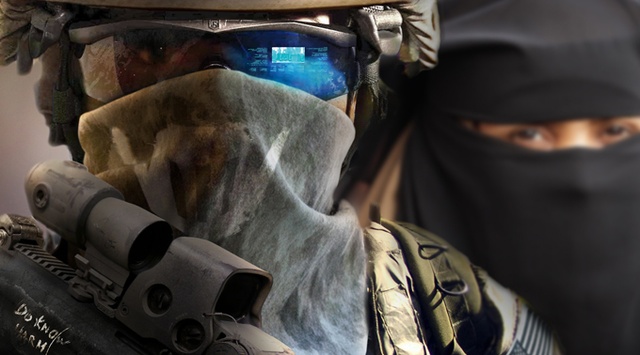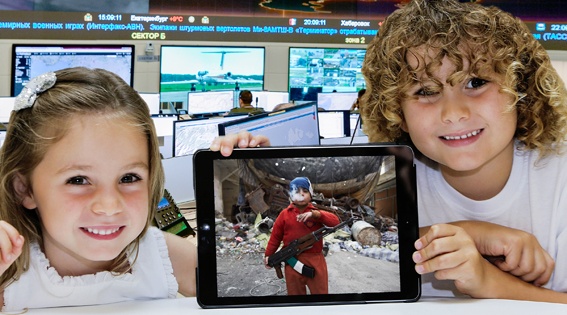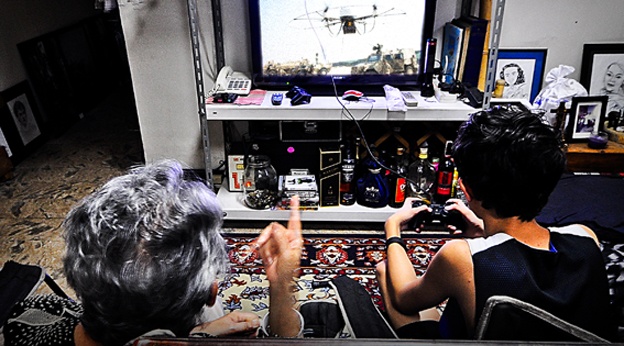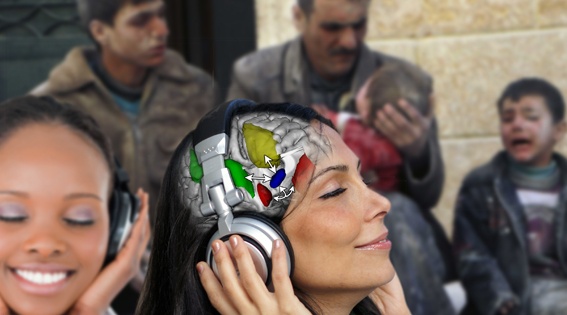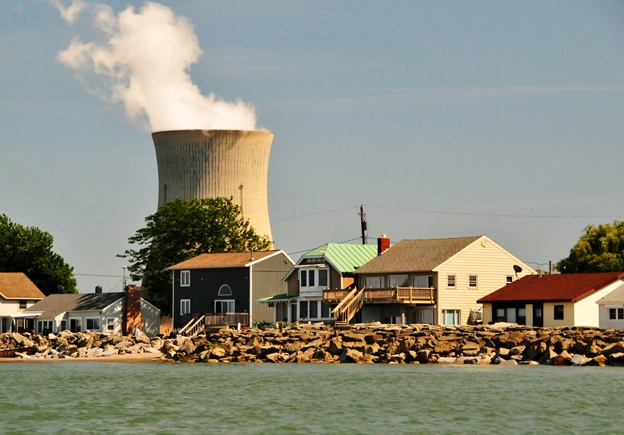ENTER THE VOID Roy Scranton and @LILINTERNET on hyperreality and reflexive narrative
The (sur)reality of screenspace, the (sur)reality of the warzone or the war room or of war caused by the universally palpable yet, among certain demographics, still contested effects of anthropogenic ecological change – our time is one characterized by spaces of hyperreal dimensions.
For this issue, we asked Roy Scranton (author of “Learning to Die in the Anthropocene”) and pop agitator Lil Internet to grapple with the above, drawing from their respective experiences. What they find is less intractable polarization, than a contemporary playing out beyond the storylines of our current narratives.
Lil Internet: You’re a writer, journalist, English professor, and war vet, having done a tour in Iraq; I’m a vet of the pop culture machine. Maybe a good place for us to start would be this question of the hyperreal versus the hyperphysical. At this point, the verisimilitude of screenspace is so convincing that people seem to be reacting to actual and perceived violence with the same emotional intensity. On the other hand, very real, physical conditions seem increasingly surreal – for instance, the effects of anthropogenic ecological change. Do warzones feel surreal?
Roy Scranton: Well, yeah, my experience of Baghdad as a warzone was filtered through “Apocalypse Now” and “Full Metal Jacket” and a whole tradition of war movies and literature that presented war as surreal. What I came to see there though was that the warzone is just another workplace. You do your job and it’s a dangerous job, but it’s still just people moving in a space. It’s surreal in that it doesn’t make sense according to our peacetime capitalist senses of identity, selfhood, and value. But if you accept the logic of the war space, it’s not surreal; it’s a different kind of world.
Lil Internet: Were you in combat?
Scranton: I wasn’t infantry in direct combat, but we were shot at and ambushed and there were IEDs [improvised explosive devices]. Another surreality: in a physical warzone, there’s a constant heightened attention to your environment – from the way the sun hits the street, to the way it smells, to a little kid looking at you by the side of the road as you’re driving down the street in a Humvee – because everything could kill you. In your daily normal life you get routinized to things, like everything is just what you do. You only get that sense of estrangement and ecstatic existence from something weird happening, or maybe by taking drugs. In a war zone, that’s your daily reality.
Lil Internet: Having experienced these two worlds, how do you see the way people speak about the violence of language (online bullying, etc.), this essentially semiotic violence that is increasingly policed? There’s virulent activism in support of “safe spaces” from offensive language (online or in places of education), and I worry because as American youth exist closer and closer to hyperreality, the gravity of physical violence seems to be lost. To you, what’s the difference between physical and semiotic violence?
Scranton: Calling someone a name is different from beating the crap out of them. At the same time, we have to recognize that semiotic violence makes physical violence more acceptable. In Iraq, for example, we called Iraqis “hajjis.” That’s clearly a form of semiotic violence: it’s a racist, derogatory term. And it justified and normalized the kind of physical violence that we were involved in every day, like running people off the road and putting innocent people in jail and so on. But they remain different kinds of violence.
Lil Internet: I wonder though about how people living outside of warzones perceive violence, people who, generally speaking, don’t experience physical violence as a constant threat. In the US and Europe, most people, at this point, spend 30% to 70% of their life online. But can this demographic conceptualize what true physical threat feels like? I mean, do Americans tend to equate the material threat of war or of climate change with the instances of semiotic violence they’ve encountered online? Maybe there are analogous situations in the past to what we’re facing right now with climate change...?
Scranton: A lot of people refer to World War II as a model for addressing climate change. They talk about how we need to name an enemy or to organize (American) society and the economy in the same kind of centralized, state-controlled way it was organized during WWII. But there’s a problem in this: climate change doesn’t offer an enemy. The “enemy” is the way we live, and it’s impossible for us to conceive of ourselves as our own enemy.
Lil Internet: Like, the enemy here is our lifestyle – a combat zone so vast, it basically touches every single space; I mean, it’s the temperature, it’s the weather. Would you say because it’s difficult to objectify this threat, people are less afraid of it? I think many people are more afraid of a perceived threat from Muslim refugees than they are over the ubiquitous and very real threat of climate change at this point.
Scranton: That’s right. I think when most people in the US think about war or the ramifications of climate change, such as resource wars, climate refugees, infrastructure collapse, government failure, they very often don’t have a personal or existential understanding of what it means to be physically threatened, repeatedly, and tend to meet these kinds of threats with extreme semiotic responses. This is behind some of the problems we’re dealing with now, where it’s like, let’s just bomb the fuck out of Syria. But that’s not going to solve the problem, actually. When we move into this imaginary space of conflict, there’s no sense of cost and so the most extreme response seems completely rational.
Lil Internet: Though in the West our general concept of war, our understanding of what it means to “bomb the fuck out of Syria,” only ever plays out on a screen, right, whether that’s on the news or in films, etc. It’s surreal to me that ISIS, in its media, uses the visual language of Hollywood: beheading videos that look like film trailers, with speed ramping, filters, CGI, soundtracks … except none of this is staged; you’re seeing actual killing. And I mean, within this spectrum, how do you even begin to say what’s simulated space and what’s “real”?
Scranton: Perhaps the question here is one of interface. Because all of us – Americans, Syrian refugees, ISIS fighters, or whatever – we all possess the same fight-or-flight responses, right? And in a physical space, if you threaten me, I have to deal with you as a physical body. But if we shift to a space where we’re separated by screens, I don’t ever have to address the material consequences of the conflict. I can just go straight to maximum retaliation. I can go straight to: you’re evil, I’m good, fuck you, we’re done. The French philosopher René Girard talks a lot about this drive to extremes, and it’s a combination of framing aggression as defense, perceiving aggression in someone else, and defining yourself: “I’m not you.”
Lil Internet: Can you imagine if we actually exploded all of the bombs we made during the nuclear arms race? In a sense, the Cold War was a symbolic war taken to the greatest extremes. Mutually assured destruction is essentially semiotic warfare. It’s a symbolic threat and governments tend to treat it as such – except the bombs are real. One polarity I think about a lot is how the West, whose experience of violence is largely mediated, places a high value on freedom of expression while Middle Eastern states, whose citizens are far more likely to experience war violence first hand, tend to have much stricter control over visual representation, like the way people dress and act. On some level, could the West’s conflict with extremist Islamic groups be read as one wherein a reality-rooted force such as ISIS is responding in an extreme way to the threat of Western hyperreality?
Scranton: Yes. And actually, to go back to WWII, thinkers and writers then were grappling with this, too – this distinction between, on the one hand, a cultural system of metaphoric exchange, a hyperreal, capitalist space where anything can be exchanged for money, which can be exchanged for anything else; and, on the other hand, a space that was being mobilized to motivate people to sacrifice for war, to give up money, time, even their lives. It presented a semiotic logic understood not through words or signs, but through bodies: the semiotics of sacrifice. The hero sacrifices his body to give meaning to a community. And I think that you’re right, ISIS is employing a semiotics of bodies: decapitated bodies, sacrificed bodies, suicide bomber bodies – this is how they’re constructing meaning.
Lil Internet: Yeah, and with strikes increasingly carried out by drones, even our warfare, on this side, is detached from bodily experience. Psychologically, this is supposedly really difficult for drone pilots because there’s no way to compartmentalize the war from other parts of life. It’s like you bomb a village and then your wife calls and asks you to pick up some milk on the way home. For people in the West who join ISIS, I imagine part of the appeal is that there isn’t this alienation. In the West, love, war, the narratives we look to for meaning in our lives are all behind a screen and coupled with an exhausting value system based on consumer culture. Meanwhile, ISIS offers the promises of an unassailable ideology, love without seduction, real war with purpose.
Scranton: One reason we reject ISIS so viscerally in the West is that our order of making meaning is one where bodies can be exchanged for other bodies: we believe that we don’t actually sacrifice bodies for concepts, we think we just use different bodies, exploit them, because it’s all interchangeable for money. But we can see this ideology break down with the controversies around the Black Lives Matter movement: the fact that these bodies – black bodies that continue, disproportionately, to be the victims of state violence – matter. They can’t be absorbed into semiotic circulation, even as Trump supporters or whoever claim that “All Lives Matter,” trying to shift the conversation away from the fact that a particular meaning is constructed through violence on particular bodies, shifting it into a total equivalence of everything, which of course serves the status quo.
Lil Internet: Right, it’s more direct. I don’t think white people in the States really have to regularly deal with that same physical fear. And when they talk about “safe spaces,” it’s not “here’s a place where you won’t get arrested or shot for standing on a corner,” it’s “here’s a place where you will be ‘protected’ from certain language,” which seems absurd to me. It’s like they’re demanding “safety” from any subjectivity that’s not their own. Plus, are we OK with giving up on security in reality for a sense of safety and security in the simulacrum?
Scranton: This reminds me of the “Game of Thrones” episode where Brienne of Tarth tries to rescue Arya Stark from the Hound, and she’s like, “You have to give her to me; I have to take her to a safe space.” And the Hound is like, “You don’t get it, there is no fucking safe space.” The truth is, we are all, right now, experiencing this widespread sense of precarity. But the 1% aren’t demanding safe spaces, they’re just building their fortresses in New Zealand with their private police. There’s this confusion we have in the US about the difference between our power to say what things are, and then the reality of how things work in real space, with actual bodies. There’s this persistent belief that if we just say the right words then we can make things safe, that we can change the conditions of existence. It might seem like a hold-over from ’90s political correctness, but it’s a persistent drive in post-WWII American culture.
Lil Internet: As though once you have semiotic or simulated safety, that violence, through this filter, will be eliminated...
Scranton: Right. And people continue to do this with threats like climate change and its ramifications. As in, if we just find the right way to talk about humanity’s relationship to nature, then we’ll solve the problem. But until material conditions change, reality is going to consistently outstrip our ability to put crisis into language.
Lil Internet: Of course in third world countries this illusion of equality doesn’t really hold, but because you and I and whatever given billionaire have the same iPhone, and access to the same smooth space of the Web, it can feel like everyone has the same opportunities, belongs to the same class. But real safety has to come from reality; and real equality has to be operative away from the keyboard, too.
Scranton: The question of trauma is key here in the way trauma functions to reintegrate physical danger and the problem of mortality within the safe space, within this other logic of purely semiotic exchange. This has been a powerful ideological, cultural factor for understanding war, death, rape, the Holocaust, all kinds of things in basic capitalist society. By turning trauma into language, we assert power over this thing that exceeds our control. But I think we’re running up against the limits of belief with that narrative. Trauma isn’t the story of Black Lives Matter, for instance; language isn’t a substitute for dead bodies. And I think it’s the same situation with climate change: we need to deal with the physical realities of the world we live in, and not just how we can transform it into a story that will make everything okay.
Lil Internet: Isn’t narrative a big part of how they treat post-traumatic stress disorder now? Like, they are trying to use the drug MDMA (known on the street as ecstasy) to help PTSD sufferers make a new narrative out of their trauma. I’m sure it helps, but isn’t objective truth sacrificed when making a new personal narrative of war while under the influence of an incredibly euphoric empathogen? If you change the narrative, you mediate reality.
Scranton: As humans, creating narratives is what we do – we make stories about the world we live in, in order to create collective meaning. There’s this book by Jonathan Lear that interests me called “Radical Hope.” It’s about the Crow Nation (Apsáalooke) Chief Plenty Coups, who saw that the white people were coming and that the Crow would no longer be able to live life as they had. So rather than fighting to the death like other tribes, Plenty Coups helped his people adapt and transition through a series of dream visions. I think what we’re currently experiencing is the fact that our stories no longer adequately serve the reality we’re experiencing, which is phenomenally complex and changing radically. Who the good guys and bad guys are, none of it quite makes sense right now.
Lil Internet: But creating a narrative that objectively reflects the complexity of conflict requires effort, and I find that people don’t want to be challenged in that way, like they don’t have the mental bandwidth for it, because they’re already stressed and feeling threatened. These easy narratives of good and evil, hero and villain, like the ones Trump provides make them feel good about themselves. I mean, I think the narrative closest to truth, to the world, to life, is always a morally ambiguous one. But in the current US presidential race, or with backlash to refugees entering the EU, the “us versus them” narrative dominates.
Scranton: I think that’s spot-on, and I think this is where people involved in the culture industry have an interesting role. When a crisis happens, people will use whatever ideas are lying around to work through that crisis. The Right has worked so that when a crisis happens they can step in and say, well what you need to do is liberalize your economy and open everything up to privatization. Which is nonsense in reality, but makes sense as a narrative. For those of us who want future human existence to mean something more than brute survival, we need to seed the kind of future that we’d like to see grow. It’s not possible to say here’s the future and we can fix it. The future is going to emerge in complex ways. But we can develop narratives and ideas that can be mobilized when crises arise, like when Occupy strategies were applied to help the Rockaways after Hurricane Sandy hit New York.
Lil Internet: So in a way you’re talking about what behavioral and cognitive science calls an “availability cascade,” right? Where if something seems like a simple response to a complex question, and is repeated often enough in public discourse – like certain buzzwords or political memes – more and more people, regardless of the idea’s actual veracity, will adopt the response and start to believe it. I think you’re right about seeding ideas for future use. I also think, working in the creative sphere, we have to think about making people willing to be challenged.
Scranton: I wonder how this applies to what you do? Making videos and producing music for figures such as Beyoncé and Diplo, creating material that reaches a pretty broad public, and young people in particular – how do you help people learn to accept being challenged?
Lil Internet: Pop culture has done a really good job making people open up; gays in mainstream society, for instance; or, I mean, look at rock ’n’ roll and black musicians in the twentieth century and how much that primed people to reduce their fear of other races and be open to shedding prejudices. I think currently we face a much more complicated, macroscopic problem of perception. Like the threat isn’t other people, it’s us, collectively. For instance, with climate change, many people still don’t believe in it, which is kind of insane. Do you have a theory as to why?
Scranton: For me, this is an interesting question because it connects back to deeply anti-scientific, anti-intellectual aspects of American culture and character, but also to something that is deeply utopian: this American idea that we can really make the world how we want it to be.
Lil Internet: I always thought of Europe as being a recovering monarchy, whereas the United States is a failed utopia...
Scranton: Right, and the huge question in American culture – from the Puritan days onward – has been, why did we fuck up and how can we fix it? And I think that is part of what motivates climate change denial in the US. It’s been fascinating to see how other countries are dealing with it, even mobilizing it as a conservative, right-wing issue. In Canada, for example, under the former Harper government, Harper didn’t deny climate change, he framed it as an economic opportunity for Canada.
Lil Internet: Oh, like it will get warmer so Canada will be more appealing...
Scranton: Yeah, and you see a similar thing with Marine Le Pen and the Front National in France: she has a climate change plank in her platform, saying that the identity of French nationality is at stake here, warning that climate change will drive more refugees to Europe. But in the States, utopianism feeds into denialist arguments on both the Right and the Left: conservatives say that climate change isn’t real, or we’re not causing it, and liberals manifest this denial via technological utopianism – as in, if we build the right machines, we can fix it.
Lil Internet: But you’d say we’re beyond fixing it, right?
Scranton: Yeah.
Lil Internet: That’s a really tricky narrative to make...
Scranton: What I’m guessing will happen is that the ramifications of climate change are going to become increasingly unmanageable. My hope is that we can create the conditions for a new way of living in the world that mitigates the worst aspects of the disaster; that we can keep things from escalating to the point where the Earth simply becomes uninhabitable for humans.
Lil Internet: Zombie apocalypse has been a really popular narrative in Hollywood the past decade … I always imagine these films to be thought exercises for when almost everyone is poor, and there’s not enough food, robots have all the jobs, the wealth gap is incredibly extreme, and so you have hundreds of millions of poor people just swarming the few bastions of security. There’s this kind of fatalism, though, in what you’re saying, like we’re doomed – but of course, if you know you’re doomed, you suddenly find yourself, paradoxically, with total freedom from any responsibility. What do we make then of the political idea of fighting for freedom?
Scranton: Freedom, I think, is a really pernicious idea. In the West, especially in the US, it remains connected to this sense of freedom from nature, an idea developed out of the profound wealth of carbon, which we’ve been able to burn like crazy and which has given us seemingly tremendous power over the Earth. We can’t just go back to living like the Crow, but we need to figure out a new value system where freedom from nature isn’t the most important thing, where we understand that a fulfilling human life can exist within nature’s limits. The idea of freedom itself is a real problem.
Lil Internet: It’s also totally subjective. For instance, American activists during the Arab Spring were supporting people fighting to overturn governments in the Middle East. But really the Islamists that filled that power vacuum were fighting for the right to live with what most Americans would consider to be less freedom, which is to say without secularism and, in their view, its corrupting forces.
Scranton: So this goes back to the question of semiotics and narrative: Is “freedom” the most important value – freedom from constraint, freedom of religion – or is there some other value? For people who don’t feel like the freedom that Western capitalism offers is available to them, it’s not a valuable thing to work for.
Lil Internet: On a really macro level, I think what a lot of people want is freedom from fear even if that means ignoring the inevitable, you know? They want freedom from facing these kinds of impending existential threats; freedom from having their subjectivity challenged, freedom from being “wrong.” Trump offers that freedom to a lot of people, so do climate change skeptics. Both deliver short term freedom from fear, the cognitive stress of complex narrative, and accountability. But the Islamists who participated in the Arab Spring wanted freedom from fear too: fear of impiety, freedom from the temptation one might feel when seeing a woman dressed immodestly.
Scranton: Often, in the West, “freedom” is just a code word for a certain way of life. Take WWII again, which was ostensibly a fight for “freedom and democracy,” but when journalists asked American soldiers what they were fighting for, they’d say “apple pie and America.” It wasn’t “We’re fighting so that the Filipino people can be free,” but because there was a perceived threat to the American way of life, a certain standard of living. That’s what freedom meant.
Lil Internet: Right, people will fight and die for the freedom from being wrong. And the fear of being wrong can polarize people. It’s almost like you make a narrative of good and evil, and then pick a side, right? And then whatever side you’re on, you fight from that position for freedom from cognitive dissonance – which is a lazy freedom, I think; a selfish one.
Scranton: I think it’s just part of how we work. Part of the tragedy of being human is that we’re trapped in this logic of determination. Most humans have a pathogenic model of identity, there’s an inside and there’s an outside, and it’s as simple as drawing as circle: as soon as you draw a circle around something, as soon as you say what something is, you’re also saying what it’s not.
Lil Internet: Again, this, too, is a question of narrative and semiotics: people tend to build echo chambers for their beliefs, and so maybe there needs to be a bait and switch. I’m thinking here of that old show “All in the Family” with the bigoted, patriotic character Archie Bunker, who a lot of people strongly identified with as a protagonist. But the writers would variously make his character sympathetic or unsympathetic, which was an ingenious way to get people sharing Archie Bunker’s bigoted beliefs to re-evaluate them, and yet without outright making anyone feel like the “bad guy.”
Scranton: What do you think about the potential for generational change? Like maybe we lose the older white people to their own fears of a changing world, but perhaps there’s a way of plugging into spectacle culture to create the conditions for new ways of thinking?
Lil Internet: I think the younger generations will be brilliant in terms of the volume and variety of information they’ll hold. But schematically, the physical alienation of social media and everyone’s individual desire to distinguish oneself from, say, the other billion people on Facebook may be a problem. Like why are face tattoos so popular in hip-hop culture, especially among young people? For one, maybe they have a different understanding of permanence, and the difference between something that happens in screenspace versus lived space; they don’t have a sense of its gravity. The face tattoo is just a new accessory for their avatar sure to get “likes” – but they have difficulty grasping the “forever” of that act on their body.
Scranton: I’m concerned, though, about this imperative to identify, the need to name oneself, one’s gender, one’s pronoun. In some ways, it’s a more sophisticated version of defining me against you, us against them. I’m concerned that in our global space of indeterminacy, polarization will only increase. When I think back to Iraq, there was a point in the civil war around 2005 to 2007 where you could tell who had killed somebody by the way they’d been killed. If they’d been decapitated, they’d been killed by Sunnis; if they had their skull drilled with a power drill, they’d been killed by Shia. And that’s also a kind of identity formation: like, “we’re not them because we decapitate people, we don’t drill into their heads.” And what happened in Iraq was in some ways promoted by the US, supported by the US, and we see that is where the kind of polarization that Trump engenders leads: this logic of, “we are who we are because we’re not those people.”
Lil Internet: I tend to find little analogies for society as a whole within prison culture, because it seems like this fully Darwinian place where civil law doesn’t apply. In prison, you see people immediately organize around race, as though this is something we still haven’t gotten over as humans. I’m still confused by why we need an “other” to make ourselves feel better, like something to which we can compare ourselves in order to feel more righteous, pious, pure. Even food taboos like, say, the gluten craze, or even going all the way back to Jewish culture rejecting pork, we seem to have a deep need to make these narratives of “bad” things just so we can think of ourselves as being “good.” I guess it’s insecurity, and the ease of such dichotomous narratives.
Scranton: Yeah, to be part of a group and know what that group means...
Lil Internet: I mean, if we could only make a narrative as successful for global warming as we have for gluten! Can you imagine a non-polarizing narrative for global warming that would work for people?
Scranton: In Alan Moore’s comic “Watchmen,” from the late ’80s, this one superhero decides that the only way to end the Cold War and unite humanity is to create this giant, fake, tentacled alien that he teleports to New York. Millions of people die, but it unites humanity against these imaginary aliens.
Lil Internet: Right. [laughs] So that’s how it goes, if only we could anthropomorphize global warming we might have a chance? Unfortunately, anthropomorphized global warming is just “us.”
Roy Scranton is the author or "Learning to Die in the Anthropocene." He has a PhD in English from Princeton University and is a fellow at CENHS (Rice University). His novel "War Porn" is forthcoming from Soho Press. Twitter: @royscranton
@LILINTERNET is an artist, video director, and producer. He works across North America and Europe with pop artists in various media. Twitter: @LILINTERNET
Notes
| [1] | @LILINTERNET, “Untitled (Video Burqa),“ 2016 |
| [2] | @LILINTERNET, “Untitled (Kids),“ 2016 |
| [3] | @LILINTERNET, “Untitled (Drone),“ 2016 |
| [4] | From left: Aegis radar screens, USS Vincennes, 1988. photo: US Navy; gaming, 2015 |
| [5] | @LILINTERNET, “Untitled (Headphones),“ 2016 |
| [6] | Svalbard, Norway, September 2015. photo: Josh Anon |
| [7] | Svalbard, Norway, September 2015. photo: Josh Anon |
| [8] | Nuclear power plant near Sandusky, Ohio, 2016. photo: Stephen Brede, Great Lakes Canoe |

